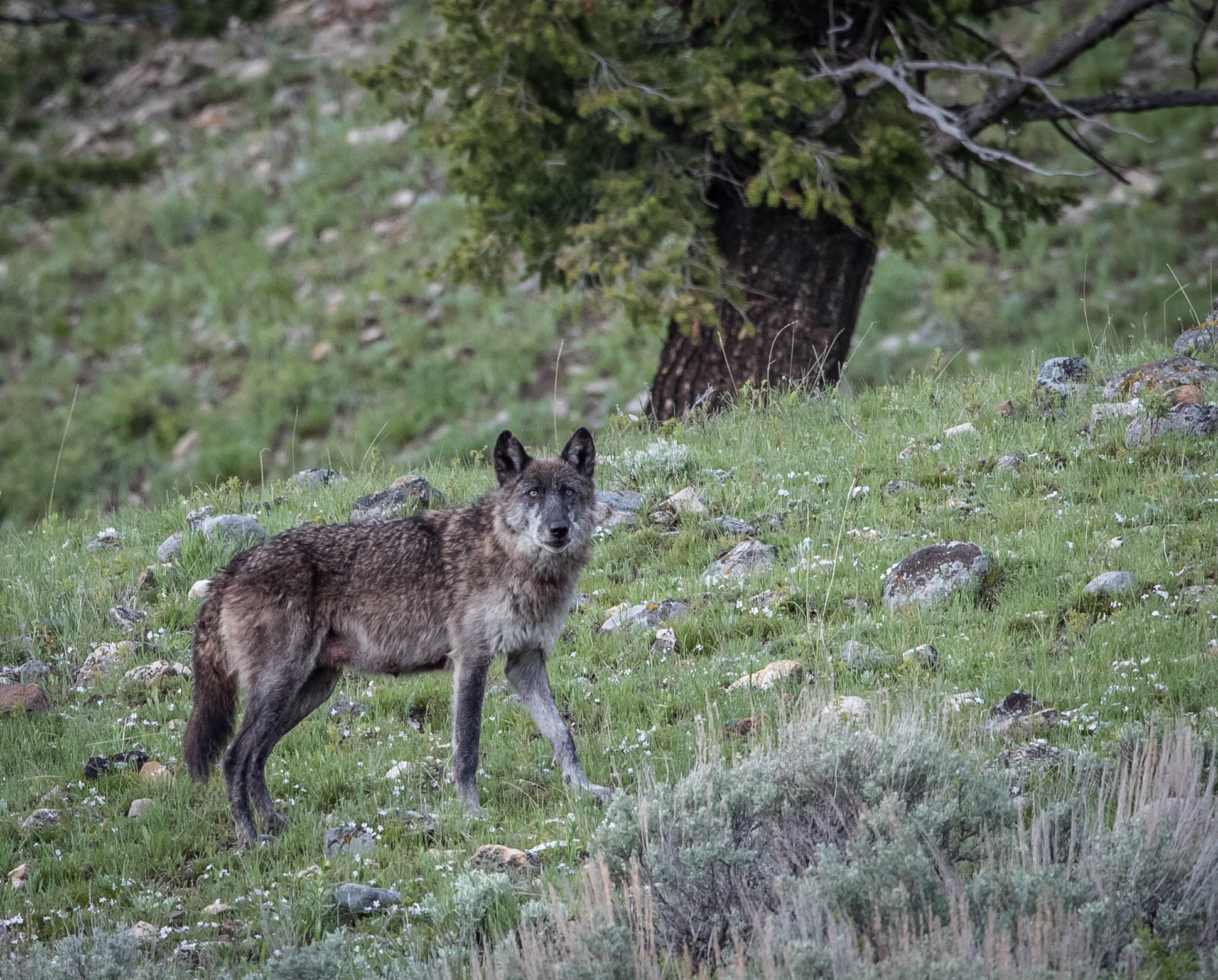Cruelty toward wolves is erasing conservation efforts. It’s time to reinstate their protections
Wyoming wolf courtesy of local photographer Tim Tennyson.
Opinion by Daniel M. Ashe
Daniel M. Ashe, president and chief executive of the Association of Zoos and Aquariums, served as U.S. Fish and Wildlife Service director from 2011 to 2017.
“Wolves in the northern Rocky Mountains are recovered and no longer warrant Endangered Species Act protections.”
I don’t know how many times I said that during my 22-year career with the U.S. Fish and Wildlife Service. Certainly dozens of times, and increasingly so during my tenure as the service’s director from 2011 to 2017. And it was true.
No longer. Today, an epidemic of cruelty toward wolves is erasing progress made to conserve this species. The government must immediately reinstate protections for these animals.
About a decade ago, I worked with Sen. Jon Tester (D-Mont.) on his legislative effort to delist wolves in Idaho and Montana, much to the chagrin of friends in the environmental community. I also worked with Wyoming’s then-Gov. Matt Mead, a Republican, to establish state-level protections to support delisting Wyoming wolves. Yes, compromises were made, such as Wyoming’s too broad and regrettably named “predator zone” — where hunters are able to kill wolves without a license. But these moves proved biologically and politically successful. They supported a continual expansion in wolf numbers and geography and at least temporarily dulled wolves as a symbol for what conservative, western elected officials called “federal overreach.”
A wolf hunt blew past its kill quota in February. Another hunt is coming this fall.
State fish and wildlife agencies and their regulatory commissions generally kept the promise to manage wolf populations scientifically and professionally, as game species. Wolves were hunted, but mostly in line with what the Boone and Crockett Club defines as “fair chase”: hunting in “a manner that does not give the hunter an improper or unfair advantage over the game animals” or that brings “no dishonor to either the hunter, the hunted, or the environment.” As a lifelong hunter, I believe that these elements are essential to the notion of sportsmanship.
Now, consider what the Idaho and Montana legislatures have done. In a fervor to reduce wolf populations — by as much as 90 percent in Idaho — they are directing the professional wildlife managers in their states to authorize methods of giving every conceivable advantage to the hunter: baiting; electronic calling; night vision equipment; unlimited weaponry; use of vehicles; snaring; unrestricted limits; and compensation for expenses (what used to be called “bounties”).
This is not wildlife management; it’s ecocide. After some anemic efforts to oppose legislative interference, state wildlife professionals are trying to manage the best they can, but no one should allow themselves to be fooled. If these legislators weren’t concerned that wolves would be re-listed under the Endangered Species Act, they’d continue raining terror until no wolves remained.
Why? Because to them, wolves are vermin. Worse, they are vermin whose presence was imposed by the federal government. Idaho has always had a particular aversion to wolves, which spread immediately to Montana. This “anti-wolf virus” is almost certain to infect Wyoming and elsewhere.
Here’s what should happen next to prevent that from spreading: The Fish and Wildlife Service should institute an emergency listing for wolves, which the law allows “at the discretion of the [Interior] Secretary” when a species faces “a significant risk to their well-being.” This will give Idaho and Montana politicians 240 days to reverse course and return management to professionals and scientists, where it belongs.
In the meantime, Interior Secretary Deb Haaland and Agriculture Secretary Tom Vilsack can issue emergency orders prohibiting the implementation of augmented hunting and trapping regulations on all lands under their jurisdiction. In their place, they could simply default to hunting regulations from 2019 or 2020.
Haaland should also direct the Fish and Wildlife Service to create a council of independent scientists and wildlife managers. It could be led by two centrist westerners — a couple of former governors come to mind. They would review wolf management objectives and recommend harvest methodologies, conforming with fair chase principles, that will support responsible wolf and predator management and can be incorporated into federal land management going forward.
Finally, President Biden should nominate a qualified Fish and Wildlife director who can unite the agency around science and provide courageous leadership. Great choices abound.
And it’s not just wolves. The Idaho virus is bound to mutate and infect other aspects of predator management. Can these same state legislatures be trusted to leave, for example, grizzly bear management to scientific and professional managers? Five years ago, I would have said yes. Now, I doubt it, especially if their forays into wolf management go unchecked.
Let’s be honest. What is happening in Idaho and Montana is not hunting. It is pure, unbridled cruelty. Anyone who participates is no hunter, and certainly no sportsman or woman. Anyone or any organization that does not speak in vociferous opposition cannot claim the mantle of conservationist. Anyone who condones or tolerates it is complicit.
Idaho’s anti-wolf virus is epidemic. It is threatening one of our nation’s greatest conservation success stories, and is a significant risk to the well-being of wolves and all predators. The vaccine is federal leadership.



